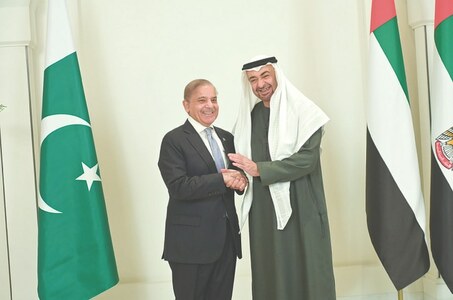UNITED NATIONS, Jan 29: The UN Security Council resumed closed-door consultation on Wednesday on the Iraq crisis ahead of US Secretary of State Colin Powell’s appearance on Feb 5 when he will present new evidence against Baghdad proving that it is not disarming.
While none of the 15-member Security Council members has publicly defended Iraqi leader Saddam Hussein but most of them want to give UN inspectors more time to finish their work.
President Bush announced on Tuesday that Secretary Powell would present the Security Council with information and intelligence about Iraq’s illegal weapons programmes, its attempts to hide weapons from inspectors, and its “links to terrorist groups.”
So far, evidence presented by the United States and Britain is still considered slight, with some nations believing Washington is trying to rush the process to meet a military timetable.
America’s European allies, France, Germany, and Belgium, are still not convinced by the case made by President Bush against President Saddam Hussein, saying that the issue can be resolved peacefully.
However, the statement of Russian leader Vladimir Putin after the UN inspectors’ report on Monday, asking Iraq to cooperate with UN weapons inspectors or Moscow would side with the US, has had its impact. “If Iraq starts hampering (the work of inspectors), I do not exclude the fact that Russia could change its position,” Mr Putin said during a visit to the Ukraine on Tuesday. “We are ready to work towards different solutions. I am not saying which, but they could be more tough than before.”
France, which has taken the consistent position that the UN inspectors should be given time to do their work in order to resolve the crisis peacefully, is still not convinced that a military action was necessary at this stage.
“I’m still waiting for some instructions from Paris but don’t count on a change,” French Ambassador Jean-Marc de La Sabliere told reporters.
Meanwhile, diplomats here say that when British Prime Minister Tony Blair comes to Washington on Friday, he is likely to urge the US president to show patience with the UN approach in order to persuade the Muslim world to cooperate.
Chief UN weapons inspector Hans Blix and Chief of the International Atomic Energy Agency (IAEA) Mohamed ElBaradei, who gave major presentations to the council on Monday, are expected to answer questions during the session on Wednesday.
Mr Blix, in his report, bolstered the American case by saying Baghdad had not yet come to a “genuine acceptance” of its disarmament obligations. He said Iraq had failed to answer crucial questions on its long-range missiles and chemical and biological arms programmes.
But Mr ElBaradei said he might be able to complete his work in a few months.













































Dear visitor, the comments section is undergoing an overhaul and will return soon.